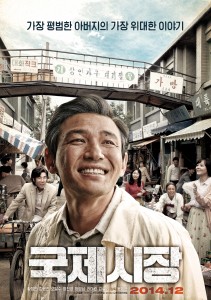 I want to introduce you to a classic film that allowed me to better understand my grandparents’ generation. Deeply touching, revolving around the value of family with the addition of Korean history in the background, Ode to My Father is a highly recommended film that reached over 14 million views. Below is the basic information along with three of the best points I found from watching the film.
I want to introduce you to a classic film that allowed me to better understand my grandparents’ generation. Deeply touching, revolving around the value of family with the addition of Korean history in the background, Ode to My Father is a highly recommended film that reached over 14 million views. Below is the basic information along with three of the best points I found from watching the film.
Basic Information
Title: Ode to My Father (국제시장)
Release Date: December 17, 2014
Genre: Drama, Romance, War
Director: Yoong Je Kyoon
Writer: Park Soo Jin
Stars: Hwang Jeong Min, Kim Yun Jin, Oh Dal Su
Strength #1 Ode to My Father tells the untold narrative of Korean fathers
The protagonist loses his father during the Korean War and takes on the tremendous responsibility of being the “head of a household” from such a young age. It was heartbreaking for me to see the father surrender his dream to be a captain and sacrifice going to college for the sake of the family.
This illustrates how a family’s well-being (on an interpersonal scale) and Korean history (on a large scale) are possible by the selfless sacrifices of our fathers.
Strength #2 Ode to My Father realistically paints the deep scars and wounds from war
The dangerous risk involved with working at the coal mines in West Germany, the breath taking fight scenes in Vietnam, and the loss of the little sister Mak Sun during the Hungnam Evacuation vividly illustrate the long-lasting pains, wounds, and overall impact of war.
The violence, the poverty, and the separation of families tugged my heart strings, reminding me how recently these events have taken place. The film lead me to reflect on how the remnants of the Korean War are still with us today.
Strength #3 Ode to My Father captures the recent economic and social transformation of Korea
Over the 70 years period during which Ode to My Father covers, I witnessed the rapid transformation of Korea’s economy as well as its culture.
His flower shop remains relatively the same through the ages, but the pavement, the traffic, and the stores around it go through a fascinating process of modernization.
Along with the noticeable changes in architecture and public roads also comes the transformation of social values. The protagonist’s grandchildren – let alone his children – are completely oblivious and unknowledgeable about the hardships, the sacrifices, and the untold wounds that he carries as a father and a survivor of the Korean War.
The miscommunication and the misunderstanding due to the generation gap propelled me to inquire about the untold stories of my grandparents. What sacrifices did they have to make? What values still remain with them from the 1940’s 50’s and 60’s?
By Hajin Lily Yi

![‘Squid Game’ director axed happy ending to reflect ‘hopeless and bleak’ reality A still from the third and final season of Netflix's series ″Squid Game″ (2021-2025) [NETFLIX]](https://www.koreadailyus.com/wp-content/uploads/2025/06/0630-SquidGame-218x150.jpg)
![‘KPop Demon Hunters’ reinvents Korean culture through a distinctively K-pop lens Clockwise from top left: Fictional girl group HUNTR/X in ″KPop Demon Hunters,″ girl group Blackpink, fictional boy band Saja Boys in ″KPop Demon Hunters,″ and boy band Stray Kids [NETFLIX, YG ENTERTAINMENT, JYP ENTERTAINMENT]](https://www.koreadailyus.com/wp-content/uploads/2025/06/0627-demonhunter-218x150.jpg)
![In ‘KPop Demon Hunters,’ Maggie Kang brings genre out of its comfort zone A still from Netflix's animated film ″KPop Demon Hunters,″ featuring Huntrix [NETFLIX]](https://www.koreadailyus.com/wp-content/uploads/2025/06/0625-DemonHunters-218x150.jpg)



